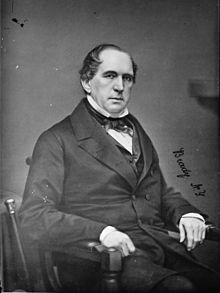Erastus Corning
| Erastus Corning | |
|---|---|

Portrait of Erastus Corning by Mathew Brady, c. 1860
|
|
| Mayor of Albany, New York | |
|
In office 1834–1837 |
|
| Preceded by | Francis Bloodgood |
| Succeeded by | Teunis Van Vechten |
| New York State Senate 3rd District (Class 3) | |
|
In office 1842–1845 |
|
| Preceded by | Friend Humphrey |
| Succeeded by | William H. Van Schoonhoven |
| Member of the United States House of Representatives from New York's 14th congressional district | |
|
In office March 4, 1857 – March 3, 1859 |
|
| Preceded by | Samuel Dickson |
| Succeeded by | John H. Reynolds |
| Member of the United States House of Representatives from New York's 14th congressional district | |
|
In office March 4, 1861 – October 5, 1863 |
|
| Preceded by | John H. Reynolds |
| Succeeded by | John V. L. Pruyn |
| Personal details | |
| Born |
December 14, 1794 Norwich, Connecticut |
| Died | April 9, 1872 (aged 77) Albany, New York |
| Resting place |
Albany Rural Cemetery Menands, New York |
| Spouse(s) | Harriet Weld (m. 1819) |
| Children | 5 |
| Profession |
|
Erastus Corning I (December 14, 1794 – April 9, 1872) was an American businessman and politician.
Corning was born in Norwich, Connecticut, the son of Bliss Corning. Corning moved to Troy, New York at the age of 13 to clerk in the hardware store of an uncle; six years later he moved to Albany, New York, where he joined the mercantile business under James Spencer. After some time at Spencer's firm, Corning became a partner, and eventually the senior partner upon Spencer's death in 1824. Corning combined the Spencer firm with holdings he inherited from his uncle to form Erastus Corning & Co. John V. L. Pruyn was married to Harriet Corning Turner (June 18, 1822 – March 22, 1859), who was Erastus Corning's niece. As a result of this family connection, Corning and Pruyn were often partners in Corning's businesses and investments.
Erastus Corning & Co. was much more than what modern readers think of as a hardware store. Corning bought and sold all manner of iron products, not merely tools and nails as one would expect but also stoves, farming equipment, and, eventually, rails and railroad iron parts and products. The company had a wharf and warehouse on the Hudson River in Albany, and the store itself served not only Albany and the surrounding towns, but hundreds of large customers from the west who visited Albany only two or three times a year to buy and sell products, restock their own supplies, and see what new was for sale. Corning's hardware store soon became one of the most significant businesses in Albany.
Corning was not content to run a hardware store, however, no matter how big the store might be. About the time he was consolidating his holdings into Erastus Corning & Co., he was also investing in banks and insurance companies. He purchased the Albany Rolling and Slitting Mill, renamed it the Albany Nail Factory, and used it to corner the market on numerous of the iron products he sold at his store. The Albany Nail Factory eventually became the Rensselaer Iron Works, which, under Corning's guidance, installed the first Bessemer converter in the United States.
By the time he was 40, Corning had helped found the Albany State Bank (he would serve as president until his death), been named to the board of the University of the State of New York, begun speculating on land in western New York (including the townsite that bears his name), and had been elected mayor of Albany. Corning served a single term as mayor, from 1834 until 1837, having been elected as a Democrat.
...
Wikipedia
